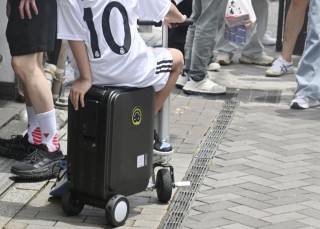Loading
Search
▼ Japan Puts Brakes On Electric Suitcases Amid Tourism Boom
- Category:Other
The growing popularity of rideable suitcases with electric motors designed to get people quickly around airports and train stations has alarmed Japanese authorities following a rise in incidents of foreign visitors using them illegally on public roads.
Japan currently classifies electric suitcases, which are particularly popular in the rest of Asia, as motorized vehicles that can be ridden on roads only with the required safety equipment and a driver's license.
Two major Japanese airports have already asked travelers not to ride them within their facilities while police are urging domestic retailers to warn customers of the strict laws concerning their use, concerned that foreign visitors are unfamiliar with the rules.
A Chinese woman became the first person referred to prosecutors in Japan in June for unlicensed driving after she was spotted riding a three-wheeled electric suitcase on a sidewalk in Osaka.
In early July, a boy from Indonesia on an electric suitcase was seen weaving his way through a crowd of pedestrians on a street of Osaka's Dotonbori district, one of the busiest shopping areas in Japan. His family was taken aback when they were told riding such devices on roads is illegal in Japan, saying they can be ridden anywhere in Indonesia.
An electric suitcase has a built-in battery and an electric motor and can travel at around 10 kilometers per hour. Those sold in Japan are priced at around 100,000 yen ($640).
Under Japanese traffic law, the suitcases are categorized as "motorized bicycles," a category that includes mini motorcycles with 50 cc or smaller engines. As such, they need to be registered and equipped with a rear view mirror and turn signals. Drivers are also required to wear a helmet and carry liability insurance.
Narita airport near Tokyo said some people using terminal buildings complained about travelers whizzing past them on electric suitcases. Chubu Centrair International Airport in Aichi Prefecture and Kansai International Airport in Osaka advise travelers not to ride them in their facilities.
In recent years, advancements in motor and battery technologies have led to the emergence of new mobility devices. Japan has seen a sharp increase in accidents involving electric scooters since a traffic law revision in July 2023 allowed their use without a driver's license.
"Unexpected new forms of transport will continue to emerge," said Takeru Shibayama, a senior scientist at the Vienna University of Technology's Institute for Transportation.
Given the range of vehicles that fall under the category of motorized bicycles in Japan, the country needs to discuss "whether a new classification should be established" to deal with electric suitcases, Shibayama added.
© KYODO
- July 29, 2024
- Comment (0)
- Trackback(0)


